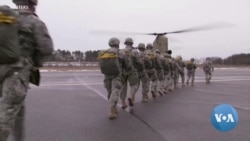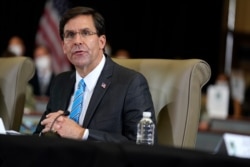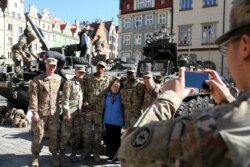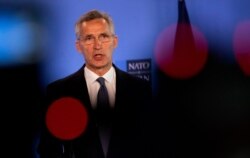The United States is pulling almost 12,000 troops from Germany, unleashing a torrent of criticism against U.S. President Donald Trump, both at home and abroad, even as senior U.S. and NATO officials defended the move as a strategic necessity.
U.S. defense officials announced the redeployment Wednesday, saying it was the result of a monthslong evaluation of the country's military posture worldwide meant to enhance Washington's ability to both deter and respond to threats from major powers such as Russia and China.
"These changes will achieve the core principles of enhancing U.S. and NATO deterrence of Russia, strengthening NATO, reassuring allies and improving U.S. strategic flexibility," U.S. Defense Secretary Mark Esper told reporters Wednesday, denying the changes were meant to punish Germany.
"This is something we want to do. We feel very good about [it]," Esper added. "We want to get there as quickly as possible."
But even as Esper and other key U.S. military officials defended the redeployments as strategic, Trump told reporters at the White House that the partial U.S. pullout from Germany, expected to begin in the next several weeks, came down to money.
"We're reducing the force because they're not paying their bill," Trump said Wednesday. "It's very simple: They're delinquent."
Germany, like other NATO members, has pledged to increase its spending on defense to at least 2% of the county's GDP (Gross Domestic Product). And while that percentage has been increasing, Germany still fell short of the mark in 2019, spending 1.38% of its GDP, or about $55 billion, on defense.
"We don't want to be the suckers anymore," Trump said, adding "other NATO countries also" could see U.S. troops leave if they do not increase defense spending.
Under the plan laid out by the Pentagon, 5,600 U.S. troops will be redeployed from Germany to other NATO allies, including Belgium and Italy. Another 6,400 will return to the United States, though most of the forces will then embark on what the Pentagon is describing as "continuous rotations" to the Black Sea region.
The U.S. will also relocate U.S. European Command (EUCOM) headquarters, along with U.S. Special Operations Command Europe, from Stuttgart to Belgium.
In addition, 2,500 U.S. airmen who had been scheduled to deploy to Germany from an airbase in Britain will now stay in Britain.
Additional U.S. troops could also be sent to Poland once an agreement, currently under discussion, is finalized, or even to the Balkans.
In all, the moves will reduce the number of U.S. troops in Germany from about 36,000 to about 24,000 and cost the U.S. several billion dollars, defense officials said.
Criticism of U.S. redeployment
Reaction to the moves from U.S. lawmakers and from German officials was swift and critical.
"Instead of strengthening NATO, the troop withdrawal will weaken the alliance," Norbert Roettgen, a senior ally of German Chancellor Angela Merkel and the chairman of the German parliament's foreign affairs committee told the Augsburger Allgemeine newspaper.
"The effectiveness of the U.S. military is not increased but reduced, especially with a view to Russia and ongoing military conflicts in the Middle East," he said.
The prime minister of the German state of Bavaria called the move regrettable.
"This puts a burden on the German-American relationship," Markus Soeder said, expressing hope the decision to pull out troops might be reversed if Trump loses in the upcoming U.S. election.
Several key U.S. lawmakers, likewise, did not hold back in their criticism.
Mitt Romney, a Republican senator who has frequently been at odds with Trump, called the partial pullout "a grave error."
"It is a slap in the face at a friend and ally when we should instead be drawing closer," Romney wrote on Twitter, adding the decision "is a gift to Russia."
Senator Bob Menendez, the top Democrat on the Senate Foreign Affairs Committee, slammed the move in a statement, saying it "will ultimately weaken U.S. efforts to counter Kremlin aggression in Europe."
"Champagne must be flowing freely this evening at the Kremlin," Menendez added.
Even U.S. lawmakers who often side with Trump offered only measured support for the plan.
"While some of the proposed moves clearly have merit, other aspects such as an arbitrary limit to the number of troops stationed in certain countries – remain troubling," Republican Mac Thornberry, the outgoing ranking member of the House Armed Services Committee, said in a statement.
such as an arbitrary limits to the number of troops stationed in certain countries — remain troubling. It is essential that we consult closely with our NATO allies on any changes. Our Committee will continue to engage with the Department of Defense as these plans evolve." 2/2
— Armed Services (@HASCRepublicans) July 29, 2020
Prior to Wednesday's announcement, multiple European officials had said if the U.S. were to pull troops from Germany, they should at least be stationed elsewhere in Europe.
Latvian Defense Minister Artis Pabriks, who earlier this month offered to host U.S. forces set to leave Germany, said punishing Germany was not in NATO's interest.
"A presence in Germany is vital for global security," he said. "If the relationship is sour, it's not good for anybody."
Moving U.S. troops, headquarters
Despite such concerns, NATO leadership Wednesday defended the U.S. decision, saying in a statement that the plan "underlines the continued commitment by the United States to NATO and to European security."
NATO Secretary General Jens Stoltenberg also said that the U.S. had consulted closely with NATO allies ahead of the announcement.
At the same time, top U.S. defense officials said they have been in contact with the U.S. State Department and Secretary of State Mike Pompeo to help facilitate the changes.
"It requires diplomacy," Defense Secretary Esper told reporters.
"I had a good conversation last week with the German defense minister," he added. "We will obviously be engaging the defense ministry in the coming days and weeks with more detail."
Those details could also include plans for relocating U.S. Africa Command headquarters, currently based with U.S. European Command in Stuttgart, though Esper and other U.S. defense officials said they have yet to formulate any concrete plans.
There are also questions about how soon the plan to redeploy U.S. troops from Germany can be put into effect.
While U.S. defense officials Wednesday said the changes would start taking place in the next several weeks, the Senate Armed Services Committee chairman, Republican Jim Inhofe, said in a statement last week after being briefed that although the overall plan "is sound … it is clear to me that this concept that will take months to plan, and years to execute."
There are also concerns about the cost benefit of moving key military headquarters.
"If I were still working in the Senate I think key questions would be how much is it going to cost to do to make these investments in Belgium and where else could that money be better spent," said Bradley Bowman, a former adviser to members of the Senate Armed Services and Foreign Relations committees, now with the Washington-based Foundation for the Defense of Democracies.
"We confront so many serious threats from Moscow and from Beijing, not to mention Pyongyang and Tehran and terrorism, I think the burden of proof is on anyone who suggests that we should spend the next defense dollar doing military construction in Belgium for a headquarters that is doing quite well in Germany," he said.
Bruno Lete, an analyst with the German Marshall Fund, warned if the plan goes through, there will be other costs, as well.
"Germany has been traditionally and is still a very important hub for U.S. operations in North Africa and the Middle East," he told VOA. "There are important logistical centers there, command and control centers. If you reduce personnel from these hubs, basically your response time will be slower."
Cindy Saine and Katherine Gypson contributed to this report.
An earlier version of this report misidentified Representative Mac Thornberry as the outgoing chair of the House Armed Services Committee. Thornberry is the outgoing ranking member. VOA regrets the error.










